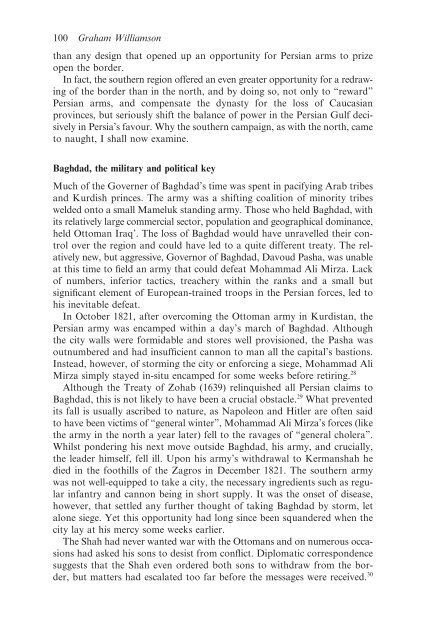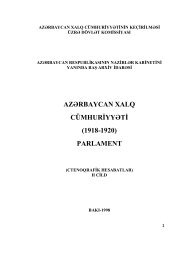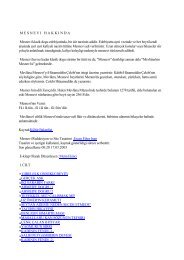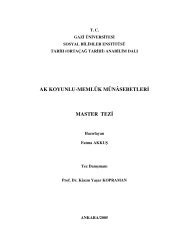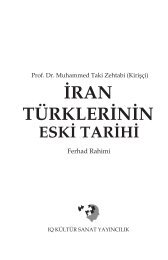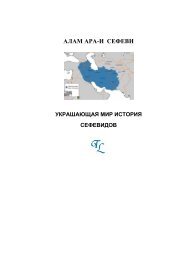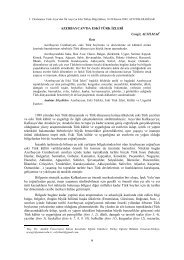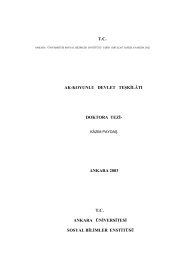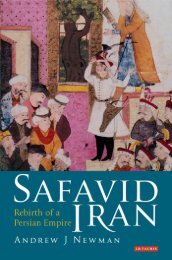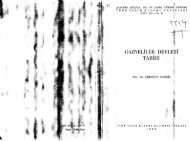War and Peace in Qajar Persia: Implications Past and ... - Oguzlar.az
War and Peace in Qajar Persia: Implications Past and ... - Oguzlar.az
War and Peace in Qajar Persia: Implications Past and ... - Oguzlar.az
- No tags were found...
You also want an ePaper? Increase the reach of your titles
YUMPU automatically turns print PDFs into web optimized ePapers that Google loves.
100 Graham Williamsonthan any design that opened up an opportunity for <strong>Persia</strong>n arms to prizeopen the border.In fact, the southern region offered an even greater opportunity for a redraw<strong>in</strong>gof the border than <strong>in</strong> the north, <strong>and</strong> by do<strong>in</strong>g so, not only to “reward”<strong>Persia</strong>n arms, <strong>and</strong> compensate the dynasty for the loss of Caucasianprov<strong>in</strong>ces, but seriously shift the balance of power <strong>in</strong> the <strong>Persia</strong>n Gulf decisively<strong>in</strong> <strong>Persia</strong>’s favour. Why the southern campaign, as with the north, cameto naught, I shall now exam<strong>in</strong>e.Baghdad, the military <strong>and</strong> political keyMuch of the Governer of Baghdad’s time was spent <strong>in</strong> pacify<strong>in</strong>g Arab tribes<strong>and</strong> Kurdish pr<strong>in</strong>ces. The army was a shift<strong>in</strong>g coalition of m<strong>in</strong>ority tribeswelded onto a small Mameluk st<strong>and</strong><strong>in</strong>g army. Those who held Baghdad, withits relatively large commercial sector, population <strong>and</strong> geographical dom<strong>in</strong>ance,held Ottoman Iraq’. The loss of Baghdad would have unravelled their controlover the region <strong>and</strong> could have led to a quite different treaty. The relativelynew, but aggressive, Governor of Baghdad, Davoud Pasha, was unableat this time to field an army that could defeat Mohammad Ali Mirza. Lackof numbers, <strong>in</strong>ferior tactics, treachery with<strong>in</strong> the ranks <strong>and</strong> a small butsignificant element of European-tra<strong>in</strong>ed troops <strong>in</strong> the <strong>Persia</strong>n forces, led tohis <strong>in</strong>evitable defeat.In October 1821, after overcom<strong>in</strong>g the Ottoman army <strong>in</strong> Kurdistan, the<strong>Persia</strong>n army was encamped with<strong>in</strong> a day’s march of Baghdad. Althoughthe city walls were formidable <strong>and</strong> stores well provisioned, the Pasha wasoutnumbered <strong>and</strong> had <strong>in</strong>sufficient cannon to man all the capital’s bastions.Instead, however, of storm<strong>in</strong>g the city or enforc<strong>in</strong>g a siege, Mohammad AliMirza simply stayed <strong>in</strong>-situ encamped for some weeks before retir<strong>in</strong>g. 28Although the Treaty of Zohab (1639) rel<strong>in</strong>quished all <strong>Persia</strong>n claims toBaghdad, this is not likely to have been a crucial obstacle. 29 What preventedits fall is usually ascribed to nature, as Napoleon <strong>and</strong> Hitler are often saidto have been victims of “general w<strong>in</strong>ter”, Mohammad Ali Mirza’s forces (likethe army <strong>in</strong> the north a year later) fell to the ravages of “general cholera”.Whilst ponder<strong>in</strong>g his next move outside Baghdad, his army, <strong>and</strong> crucially,the leader himself, fell ill. Upon his army’s withdrawal to Kermanshah hedied <strong>in</strong> the foothills of the Zagros <strong>in</strong> December 1821. The southern armywas not well-equipped to take a city, the necessary <strong>in</strong>gredients such as regular<strong>in</strong>fantry <strong>and</strong> cannon be<strong>in</strong>g <strong>in</strong> short supply. It was the onset of disease,however, that settled any further thought of tak<strong>in</strong>g Baghdad by storm, letalone siege. Yet this opportunity had long s<strong>in</strong>ce been squ<strong>and</strong>ered when thecity lay at his mercy some weeks earlier.The Shah had never wanted war with the Ottomans <strong>and</strong> on numerous occasionshad asked his sons to desist from conflict. Diplomatic correspondencesuggests that the Shah even ordered both sons to withdraw from the border,but matters had escalated too far before the messages were received. 30


